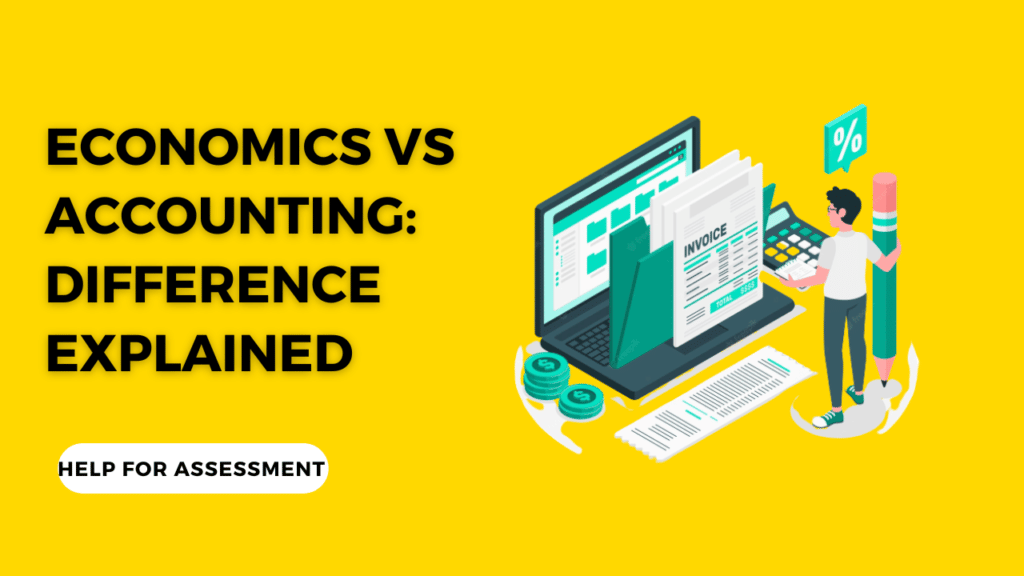Accounting and economics deal with numbers. While accounting and economics have elements that easily overlap, they have differences that we need to bring to your attention.
The difference between accounting and economics is the focus area. Accountants record, analyze, and report income and expenses while economist focus on the production, consumption, and resource transfer according to Investopedia.
In this guide, we look at the definition of accounting economics. Then, we dive deeper into the distinctions between them.
What is the Definition of Accounting?
Accounting is a process that focuses on the recording, analysis, and reporting of a business’s finances. Accounting enables companies, organizations, and entrepreneurs to understand the financial well-being of their entities.
Businesses, companies, and organizations can use the financial reports generated by accountant to make informed financial decisions for their entities.
What is Economics?
Economics is a social science that focuses on how people use of resources to create goods and service. Economics students learn about the production and distribution of goods, the effect of income and price on consumer behavior, economic prediction, and people’s purchasing power.
The two major branches of economics are macroeconomics and microeconomics:
- Macroeconomics: It focuses on an entire economics ecosystem, specifically on its function, efficiency, and challenges.
- Microeconomics: It focuses on people’s behavior in the macroeconomics system, mostly focusing on the effect of consumers’ purchasing power on the distribution of goods and services.
What Are The Differences Between Accounting and Economics?
Accounting is a profession committed to documenting, analyzing, and reporting revenue and costs, whereas economics is a social science concerned with the production, consumption, and transfer of resources.
The following is a simplified summary of the difference between these two fields of study:
| Accounting | Economics | ||
| 1. | Rules | Accounting uses a set of rules to explain mathematics | Economics requires the study of complex mathematics |
| 2. | Theories | Accounting doesn’t study theories but requires practical knowledge | Economics focuses on the study and understanding of theories. |
| 3. | Focus | Accountants do document and report revenue and costs. | Economists handle the production and transfer of resources. |
Focus Areas
Economics use algebra, calculus, and differential equations to explain intricate situations and procedures. You will take classes such as Intermediate Price Theory, International Economics, Money and Banking, and Behavioral Economics if you pursue an economics degree.
Accounting explains arithmetic’s straightforward rule sets. You’ll study financial accounting, advanced managerial accounting, statistics, federal income taxation, the tax law, and auditing if you pursue a degree in accounting.
Therefore, accounting and economics require extensive study of numbers.
Career Path and Demand for Accountants and Economists
A bachelor’s degree in accounting puts you on a clear path to entry-level positions in accounting, finance, or auditing. An economics degree open jobs in different areas, including banking, consulting, law, finance, risk management, actuaries, market research analysis, and public administration.
According to the Bureau of Labor and Statistics, the demand for accountants and auditors is set to rise by up to 4% by 2032. At the same time, BLS projected that employment for economists is set to grow by up to 6 percent by the same year.
As the economy expands, there should be a greater demand for individuals to produce and review financial records. Also, the health of the entire economy may have a direct correlation with the job growth for accountants.
Cost for In Class and Online Learning in Accounting and Economics
Students that major in accounting and economics pay between $30,000 and $70,000 for a four-year degree.
Tuition varies based on the institution, meaning how much you pay will depending on whether you’ve enrolled in a public or private school. The location of the school also determines the average cost of the course for a given period.
Some reputable colleges, such as Western Governors University, offer bachelor and master’s degrees in accounting and economics online.
Coursera, Udemy, and similar online learning platforms provide a low-cost alternative to traditional education for the cost conscious students. So if you prefer the online class route, such digital platforms can help you cut on costs.
Should I Take Accounting or Economics Degree?
Study accounting if you love crunching numbers and following laws and regulations. Otherwise, enroll in an economics course if you appreciate complex numerical, problem-solution focused, and analytical tasks.
Neither accounting nor economics is superior to the other because both lead to diverse, engaging, and lucrative employment.
A degree in economics can open up opportunities for you in fields such as law, risk management, banking, and finance. A degree in accounting will land you an opportunity in businesses, companies, and organizations for which you can record and manage transactions, account ledgers, and tax reports.
Can I Become an Accountant with a Degree In Economics?
You can work as an accountant with an economics degree because you have analytical and financial skills. Some companies may recruit you with an economics degree for an entry-level or graduate position in accounting or finance with the intention of teaching you accounting skills.
Is the Accounting Course Hard?
A course in accounting is not easy because it’s not so obvious, but it may not be as difficult if you have a strong grasp of accounting structure, ideas, laws, and regulations.
You’ll learn foreign concepts and terminologies in accounting, some of which may be difficult to understand. However, you should you’ll become more knowledgeable and competent in the subject if you attend regular classes, pay attention to your professor, and stay up to date with the course materials.

